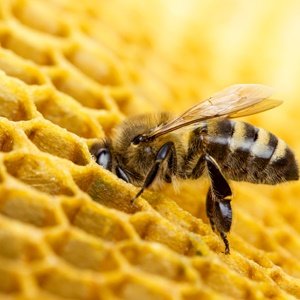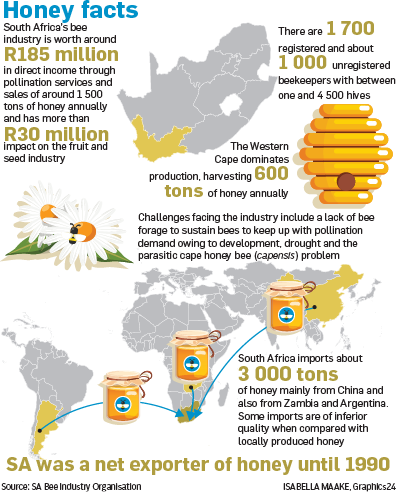Beekeeping is now entering the world of Technology
Bees are very hard working little creatures. If we did not have bees, our planet would've been a different place. And now Beekeeping is entering the world of technology.

I have alsways found Beekeeping very interesting and now a beekeeper from the South Coast of Natal, South Africa, has realised that things like Airbnb and Uber should not be the only areas of disruption and with the shortage of bees and honey, she is developing a Mobile and online app to take beekeeping to the next level :)
“Beedale is designed to help bee farmers keep very good and practical record of their hives, assist with tracking production, pests and diseases. It will also link both large and small farmers with commercial buyers. While the Beedale software is relevant for all hives, our Smart Hive innovation will send a message when a hive is ready for harvest and let farmers know that a buyer is ready to purchase at a fair price,” Worthman said.
This would make it possible for small farmers to get their product to food companies as there were many barriers to entry such as stringent labelling and barcode requirements and the need for professional branding to access supermarket shelves directly.
She plans to launch the innovations commercially in February 2018.
You can read the full news article here
Different types of bees
Worldwide, there are around 25,000 different types of bee species (around 4,000 in the U.S.). This huge number is divided into over 4,000 genera of bees, which are then further subdivided into just nine families of bees. The Apidae family is perhaps the most well-known family, with familiar members such as the honeybee, carpenter bee, and bumblebee.
All of these species dutifully serve as pollinators of our agricultural world. And they are all excellent at what they do. For example, all bees have stiff hairs and pockets on their legs, allowing them to collect more pollen and be more efficient transporters of it between plants. Not only that, bumblebees appear to be even more successful at pollinating certain crops due to their larger sizes and more vigorous vibrations. This helps to better disperse pollen amongst the flowers and fruits it visits.
Content Source
Why is bees so important part of nature
I recently had a conversation where we were discussing how important it is to use honey from the local area where you live as you should build up a resistance to allergies as per the statement below .
When a person eats local honey, they are thought to be ingesting local pollen. Over time, a person may become less-sensitive to this pollen. As a result, they may experience fewer seasonal allergy symptoms. It's true that bees pollinate flowers and make honey.
Content Source
Some facts about South African Bees
Happy Steeming!


Awesome! Gosh I love honey and therefor bees :-)
LOL Me too :)
I had no idea local honey could help against allergies! I have to inform some of my friend who suffer each summer. Thanks!
It cured my allergies.
Followed.
Great :) Glad that I could help :)
Because honey is rich with vitamin c, which is good for the skin.
Hi, I am a beekeeper in London (UK).
Any idea when the beedale app may be available?
Thanks
Hi @giovyx, it looks like February 2018. Followed you :) My parents live in the same town as the lady that is releasing the app. I will see if I can get hold of her and maybe put you in touch ?
I remember someone telling me a while ago that honey from Yemen is one of the most sought after. Anyone know if there's any truth to that?
Looks like it is close to top of the range :)
Thanks.
I thought it was bookkeeping :) Bees is huge industry.
Any idea how to distinguish if its a pure honey bees or not? Pure honey bee is not attracted by ants, they avoid it.
Hi @jacor, today you taught me something new, now I must go search for those local honey producers!!
This bee a nice post.
Wow, I love informative articles like this. That app kinda sounds like a farming game, where you get alerts when honey is prepared, pest attack etc. Also this info regarding pollen allergy resistance is totally new for me. And reading it, I think this could be the simplest way to immunize pollen allergy patients. I say this because my sister suffers from pollen allergy, when during the time of harvesting crops.